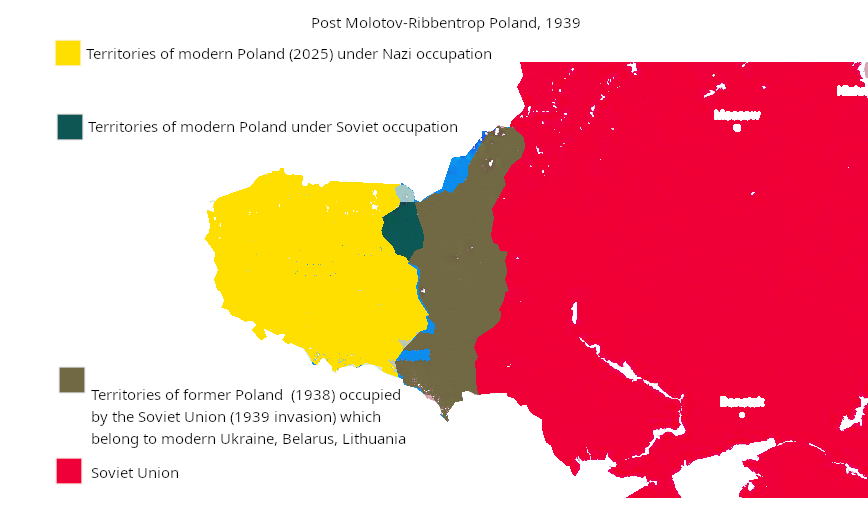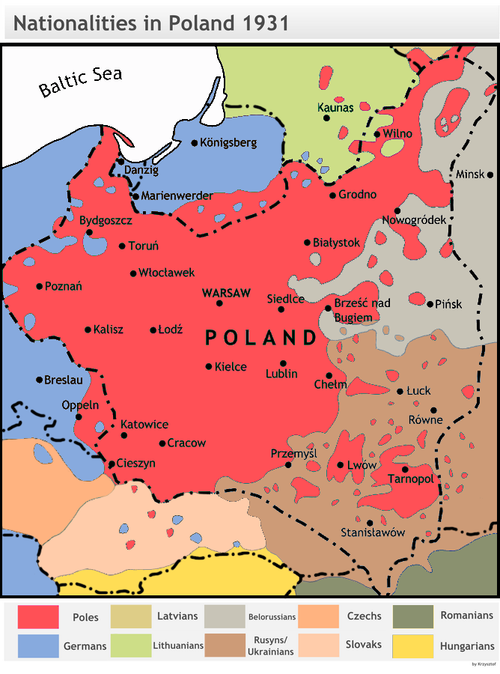I guess my question is who gave the Americans the right? I say this as an American. But would not the world be a better place if we just minded our own business and quit nation building and stoking non existant fires?
I guess my question is who gave the Americans the right? I say this as an American. But would not the world be a better place if we just minded our own business and quit nation building and stoking non existant fires?
Against the ones who saved Europe from Nazism?
Lol nice try
What on Earth are you talking about? My country, Spain, only received weapons and military aid against fascism from the USSR years before WW2 started, during the Spanish civil war. The Soviet Union was the most antifascist state in Europe, and I wish my country would have been next to the Soviets so that we wouldn’t have endured almost 40 years of fascist regime.
Sure, just forget about Lithuania, Poland, Czechoslovakia, Estonia, and so on and on and on.
The soviet union teamed up with the nazis and started the second world war, check out the molotov ribentrop act.
Also: why chose between two bad things, Franco and the USSR when you can aim for the free world? Are you unhappy i the EU?
Wanna discuss Molotov Ribbentrop? Let’s discuss Molotov Ribbentrop
Ok, I’ll try to explain this in detail and in good faith. Please, I beg you do the effort of reading through my comment, I’ll explain the reasons why I believe Molotov-Ribbentrop wasn’t imperialism:
1) Most of the invaded “Polish” territories actually belong to modern Lithuania, Ukraine and Belarus. In 1919, Poland started the Polish-Ukrainian war and invaded Ukraine, Belarus and part of the RSFSR. This so-called “carving of Poland by the Soviet Union” liberated many formerly oppressed non-Polish national ethnicities such as Lithuanians in Polish-controlled Vilnius arguably being genocided, or ceding the city of Lviv to the Ukraine SSR. Here’s a map of the territories of modern Poland that were actually invaded by the Soviets, and which ones (the vast majority) actually belong to modern Ukraine and Belarus.
And here’s a map of the pre-Molotov-Ribbentrop Poland and the majority ethnicities per region:
Please look at those two maps, and notice how the “Polish” territories invaded by the Soviet Union in 1939 were actually Ukrainian/Belarusian/Lithuanian majority and were returned to their corresponding republics after they were invaded and forcefully taken by Polish nationalists in 1919.
2) The Soviet Union had been trying for the entire 1930s to establish a mutual-defense agreement with Poland, France and Britain against the Nazis, under the doctrine of the then-People’s Commisar of Foreign Affairs Maxim Litvinov. This decade-long proposal for mutual-defence went completely ignored by France and England, which hoped to see a Nazi-Soviet conflict that would destroy both countries, and Poland didn’t agree to negotiations by itself either. The Soviet government went as far as to offer to send one million troops together with artillery, tanking and aviation, to Poland and France. The response was ignoring these pleas and offerings.
Furthermore, this armistice between the Soviet Union and Nazi Germany happened only one year after the Munich Betrayal. The Soviet Union and France had a Mutual Defense Agreement with Czechoslovakia, which France (together with the UK) unilaterally violated in agreement with the Nazis when ceding Czechoslovak territories to Nazi Germany. Stalin offered France, as an alternative to the Munich Betrayals, a coordinated and two-front attack to Nazi Germany, which France rejected in favour of the Munich Agreements.
3) The Soviet Union had been through WW1 up to 1917, the Russian Civil War up to 1922 (including a famine that killed millions) in which western powers like France, England or the USA invaded the Bolsheviks and helped the tsarist Whites to reestablish tsarism, which ultimately ended with a costly Bolshevik victory; the many deaths of famine during the land-collectivization of 1929-1933, and up to 1929 was a mostly feudal empire with little to no industry to speak of. Only after the 1929 and 1934 5-year plans did the USSR manage to slightly industrialize, but these 10 years of industrialization were barely anything in comparison with the 100 years of industrialization Nazi Germany enjoyed. The Soviet Union in 1939 was utterly underdeveloped to face Nazi Germany alone, as proven further by the 27 million casualties in the war that ended Nazism. The fact that the Soviet Union “carved Eastern Europe” in the so-called “secret protocol” was mostly in self-defense. The geography of the Great European Plain made it extremely difficult to have any meaningful defenses against Nazis with weaponry and technological superiority, again proven by the fact that the first meaningful victory against Nazis was not in open field but in the battle of Stalingrad, which consisted more of a siege of a city. The Soviet Union, out of self-preservation, wanted to simply add more Soviet-controlled distance between themselves and the Nazis. You don’t have to take my word for all of this, you can hear it from western diplomats and officials from the period itself. I hope nobody will find my choice of personalities to reflect a pro-Soviet bias:
“In those days the Soviet Government had grave reason to fear that they would be left one-on-one to face the Nazi fury. Stalin took measures which no free democracy could regard otherwise than with distaste. Yet I never doubted myself that his cardinal aim had been to hold the German armies off from Russia for as long as might be” (Paraphrased from Churchill’s December 1944 remarks in the House of Commons.)
“It would be unwise to assume Stalin approves of Hitler’s aggression. Probably the Soviet Government has merely sought a delaying tactic, not wanting to be the next victim. They will have a rude awakening, but they think, at least for now, they can keep the wolf from the door” Franklin D. Roosevelt (President of the United States, 1933–1945), from Harold L. Ickes’s diary entries, early September 1939. Ickes’s diaries are published as The Secret Diary of Harold Ickes.
"One must suppose that the Soviet Government, seeing no immediate prospect of real support from outside, decided to make its own arrangements for self‑defence, however unpalatable such an agreement might appear. We in this House cannot be astonished that a government acting solely on grounds of power politics should take that course” Neville Chamberlain House of Commons Statement, August 24, 1939 (one day after pact’s signing)
"It seemed to me that the Soviet leaders believed conflict with Nazi Germany was inescapable. But, lacking clear assurances of military partnership from England and France, they resolved that a ‘breathing spell’ was urgently needed. In that sense, the pact with Germany was a temporary expedient to keep the wolf from the door” Joseph E. Davies (U.S. Ambassador to the USSR, 1937–1938) Mission to Moscow (1941)
I could go on with quotes but you get my point.
4) The Soviet Union invaded Poland 2 weeks after the Nazis, at a time when there was no functioning Polish government anymore. Given the total crushing of the Polish forces by the Nazis and the rejection of a mutual-defense agreement from England and France with the Soviets, there is only one alternative to Soviet occupation of Eastern Poland: Nazi occupation of Eastern Poland. Seriously, what was the alternative, letting Nazis genocide even further east, killing arguably millions more in the process over these two years between Molotov-Ribbentrop and Operation Barbarossa? France and England, which did have a mutual-defense agreement with Poland, initiated war against Germany as a consequence of the Nazi invasion, but famously did not start war against the Soviets, the main reason in my opinion being the completely different character of the Soviet invasion. Regardless of this, please tell me. After the rejection of mutual-defense agreements with the Soviet Union: what was the alternative other than Nazi occupation of Eastern Poland?
I beg you answer point by point on my response because I’ve taken the time to do the actual reading on this, and I’m yet to see anything that can really challenge any of the points I’m making. Maybe you do have knowledge I’m missing and which would help me understand the history of Molotov-Ribbentrop better.
Thanks for reading anyway.
And how do you explain Holodomor? Katyn? The Winter war? The annexation of the Baltic states? The Prague coup? The suppression of the Hungarian revolution? The suppression of the Prague spring? How does the Nazis being worse justify the authoritarian and imperialist things the USSR did?
So you just ignore my entire comment and try to find other “Soviet history compilation: best gotcha moments”? Answer to my previous comment in good faith and I’ll answer to you in the same way
The original question at stake here was why western Europe would want protection from Soviet invasion. I have provided a list of reasons. Should probably have put it earlier in the comment chain, but you haven’t even pretended to adress it. I do acrually have some synpathy for your argument of the necessity of the USSR accepting the Molotov-Ribbentropp in the face of the weatern allies’ refusal, but I still find it a rather weak argument considering how completely unprepared the USSR was when Barbarossa began, because they don’t seem to have accomplished much with their vaunted breathing room. Not that any of this justifies the decades of occupation and oppression after the war.
AI slop lol
I wrote that myself, buddy, you’ll probably be able to even find Spanish to English translation mistakes if you can look and correlate lmao. I specifically asked you to argue in good faith, I hope you can change your mind and actually do that